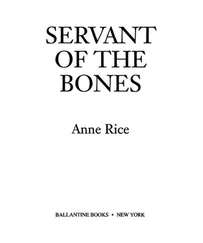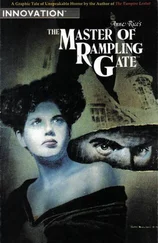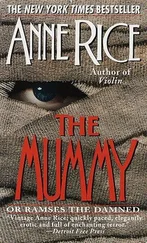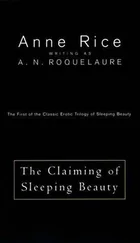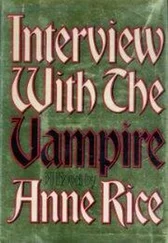Anne Rice - The Vampire Armand
Здесь есть возможность читать онлайн «Anne Rice - The Vampire Armand» весь текст электронной книги совершенно бесплатно (целиком полную версию без сокращений). В некоторых случаях можно слушать аудио, скачать через торрент в формате fb2 и присутствует краткое содержание. Жанр: Ужасы и Мистика, на английском языке. Описание произведения, (предисловие) а так же отзывы посетителей доступны на портале библиотеки ЛибКат.
- Название:The Vampire Armand
- Автор:
- Жанр:
- Год:неизвестен
- ISBN:нет данных
- Рейтинг книги:4 / 5. Голосов: 1
-
Избранное:Добавить в избранное
- Отзывы:
-
Ваша оценка:
- 80
- 1
- 2
- 3
- 4
- 5
The Vampire Armand: краткое содержание, описание и аннотация
Предлагаем к чтению аннотацию, описание, краткое содержание или предисловие (зависит от того, что написал сам автор книги «The Vampire Armand»). Если вы не нашли необходимую информацию о книге — напишите в комментариях, мы постараемся отыскать её.
The Vampire Armand — читать онлайн бесплатно полную книгу (весь текст) целиком
Ниже представлен текст книги, разбитый по страницам. Система сохранения места последней прочитанной страницы, позволяет с удобством читать онлайн бесплатно книгу «The Vampire Armand», без необходимости каждый раз заново искать на чём Вы остановились. Поставьте закладку, и сможете в любой момент перейти на страницу, на которой закончили чтение.
Интервал:
Закладка:
"Not by human hands!" I whispered. I dropped the brush. I put my hands over my face.
I searched for the words in Greek. When I said them, several of the boys nodded, but they didn't grasp the meaning. How could I explain to them the catastrophe? I looked at my fingers. What had become of-. There all recollection burnt up and I was left suddenly with Amadeo.
"I can't do it." I stared at the canvas, at the mess of colors.
"Maybe if it was wood, not cloth, I could do it."
What had it been that I could do? They didn't understand.
He was not the Living Lord, my Master, the blond one, the blond one with the icy blue eyes.
But he was my Lord. And I could not do this thing that was meant to be done.
To comfort me, to distract me, the boys took up their brushes and quickly astonished me with pictures that ran like a stream out of their quick applications of the brush.
A boy's face, cheeks, lips, eyes, yes, and reddish-golden hair in profusion. Good Lord, it was I... it was not a canvas but a mirror. It was this Amadeo. Riccardo took over to refine the expression, to deepen the eyes and work a sorcery on the tongue so I seemed about to speak. What was this rampant magic that made a boy appear out of nothing, most natural, at a casual angle, with knitted brows and streaks of unkempt hair over his ear?
It seemed both blasphemous and beautiful, this fluid, abandoned fleshly figure.
Riccardo spelled the letters out in Greek as he wrote them. Then he threw the brush down. He cried:
"A very different picture is what our Master has in mind." He snatched up the drawings.
They pulled me through the house, the "palazzo" as they called it, teaching me the word with relish.
The entire place was filled with such paintings-on its walls, its ceilings, on panels and canvases stacked against each other-towering pictures full of ruined buildings, broken columns, rampant greenery, distant mountains and an endless stream of busy people with flushed faces, their luxuriant hair and gorgeous clothing always rumpled and curling in a wind.
It was like the big platters of fruit and meats that they brought out and set before me. A mad disorder, an abundance for the sake of itself, a great drench of colors and shapes. It was like the wine, too sweet and light.
3
IT WAS LIKE the city below when they threw open the windows, and I saw the small black boats-gondolas, even then-in brilliant sunlight coursing through the greenish waters, when I saw the men in their sumptuous scarlet or gold cloaks hurrying along the quays.
Into our gondolas we piled, a troop of us, and suddenly we traveled in graceful darting silence among the facades, each huge house as magnificent as a Cathedral, with its narrow pointed arches, its lotus windows, its covering of gleaming white stone.
Even the older, sorrier dwellings, not too ornate but nevertheless monstrous in size, were plastered in colors, a rose so deep it seemed to come from crushed petals, a green so thick it seemed to have been mixed from the opaque water itself.
Out into the Piazza San Marco we came, amid the long fantastically regular arcades on both sides.
It seemed the very gathering place of Heaven as I stared at the hundreds milling before the distant golden domes of the church.
Golden domes. Golden domes.
Some old tale had been told to me of golden domes, and I had seen them in a darkling picture, had I not? Sacred domes, lost domes, domes in flames, a church violated, as I had been violated. Ah, ruin, ruin was gone, laid waste by the sudden eruption all around me of what was vital and whole! How had all this been born out of wintry ashes? How had I died among snows and smoking fires and come to rise here beneath this caressing sun?
Its warm sweet light bathed beggars and tradesmen; it shone on princes passing with pages to carry their ornate velvet trains behind them, on the booksellers who spread their books beneath scarlet canopies, lute players who vied for small coins.
The wares of the wide diabolical world were displayed in the shops and market stalls-glassware such as I have never beheld, including goblets of all possible colors, not to mention little figurines of glass including animals and human beings and other filmy shining trinkets. There were marvelously bright and beautifully turned beads for rosaries; magnificent laces in grand and graceful patterns, including even snowy white pictures of actual church towers and little houses with windows and doors; great feathery plumes from birds I couldn't name; other exotic species flapping and screeching in gilt cages; and the finest and most magnificently worked multicolored carpets only too reminiscent of the powerful Turks and their capital from which I'd come. Nevertheless, who resists such carpets? Forbidden by law to render human beings, Moslems rendered flowers, arabesques, labyrinthian curlicues and other such designs with bold dyes and awe-inspiring exactitude. There were oils for lamps, tapers, candles, incense, and great displays of glistering jewels of indescribable beauty and the most delicate work of the goldsmiths and silversmiths, in plate and ornamental items both newly made and old. There were shops that sold only spices. There were shops that sold medicines and cures. There were bronze statues, lion heads, lanterns and weapons. There were cloth merchants with the silks of the East, the finest woven wools dyed in miraculous tints, cotton and linen and fine specimens of embroidery, and ribbons galore.
Men and women here appeared immensely wealthy, feasting casually on fresh meat tarts in the cookshops, drinking clear red wine and eating sweet cakes full of cream.
There were booksellers offering the new printed books, of which the other apprentices told me eagerly, explaining the marvelous invention of the printing press, which had only lately made it possible for men far and wide to acquire not only books of letters and words but books of drawn pictures as well.
Venice already had dozens of small print shops and publishers where the presses were hard at work producing books in Greek as well as Latin, and in the vernacular tongue-the soft singing tongue- which the apprentices spoke amongst themselves.
They let me stop to glut my eyes on these wonders, these machines that made pages for books.
But they did have their chores, Riccardo and the others-they were to scoop up the prints and engravings of the German painters for our Master, pictures made by the new printing presses of old wonders by Memling, Van Eyck, or Hieronymus Bosch. Our Master was always in the market for them. Such drawings brought the north to the south. Our Master was a champion of such wonders. Our Master was pleased that over one hundred printing presses filled our city, that he could throw away his coarse inaccurate copies of Livy and Virgil and have now corrected printed texts.
Oh, it was such a load of information.
And no less important than the literature or paintings of the universe was the matter of my clothes. We had to get the tailors to stop everything to dress me properly according to small chalk drawings which the Master had made.
Handwritten letters of credit had to be taken to the banks. I was to have money. Everyone was to have money. I had never touched such a thing as money.
Money was pretty-Florentine gold or silver, German florins, Bohemian groschens, fancy old coins minted under the rulers of Venice who were called the Doges, exotic coins from the Constantinople of old. I was given a little sack of my own clinking clanking money. We tied our "purses" to our belts.
One of the boys bought me a small wonder because I stared at it. It was a ticking watch. I couldn't grasp the theory of it, this tiny ticking thing, all encrusted with jewels, and not all the hands pointed at the sky would teach me. At last with a shock I realized: It was, beneath its filigree and paint, its strange glass and bejeweled frame, a tiny clock!
Читать дальшеИнтервал:
Закладка:
Похожие книги на «The Vampire Armand»
Представляем Вашему вниманию похожие книги на «The Vampire Armand» списком для выбора. Мы отобрали схожую по названию и смыслу литературу в надежде предоставить читателям больше вариантов отыскать новые, интересные, ещё непрочитанные произведения.
Обсуждение, отзывы о книге «The Vampire Armand» и просто собственные мнения читателей. Оставьте ваши комментарии, напишите, что Вы думаете о произведении, его смысле или главных героях. Укажите что конкретно понравилось, а что нет, и почему Вы так считаете.


